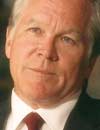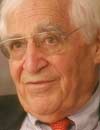- Floyd Abrams
First Amendment attorney - Lucy Dalglish
Executive director, The Reporters Committee for Freedom of the Press - Len Downie
Editor, The Washington Post - Bill Keller
Editor, The New York Times - Norm Pearlstine
Former editor in chief, Time Inc. - Walter Pincus
Reporter, The Washington Post
You know, there was a recent settlement in another case, in the Wen Ho Lee case.
Yes, I was involved in that.
Confidential sources are involved, journalists weren't defendants, and yet you settled.
Yeah.
Doesn't that invite more?
That's the risk of it. It was a very painful situation.
Why did that happen?
Why was there a settlement? There was a settlement because the journalist had been ordered to testify. The ruling, ordering them to testify and holding them in contempt for not testifying, had been affirmed by the Court of Appeals. The Court of Appeals had then not agreed to re-hear the case, so it was done in the Court of Appeals in Washington.
In those circumstances in which the reporters might have been jailed and/or there might have been enormous fines levied on the publications for which the journalists worked, if they could get out by paying some reasonably small amount of money, it was a good idea to do so. But was it painful to do so? Absolutely. Absolutely.
Is there some risk that can encourage others? Yeah, yeah. In real life these days, there are a lot of really hard decisions, and one of them in the [Wen Ho Lee] case was whether to settle or not. But there were no more legal steps to be taken other than the possibility of the U.S. Supreme Court agreeing to hear the case, which post-settlement they declined to do. ... So a very tough decision was made to --
Pony up some money.
To pony up some money. At least it had the effect of protecting the journalists against being jailed and protecting the sources. It was a way of assuring that these sources would not be revealed.
It was to that degree certainly a highly principled act, but whether, as your question suggests, it could wind up leading to more problems in the future, it's hard to know. I think it won't. But it's a real problem. That just illustrates again the complexity of this area and the dangers that can befall journalists, newspapers, broadcasters in this area in the future. ...
Let me take you back to the Wen Ho Lee case. Recently four major media organizations paid a settlement in the case.
Yes. Very, very, very troubling. What really bothers me about this case is I don't know that I would have done anything differently. We know that the law right now, as it stands, is bad. The Supreme Court refused to take the case. We know that the judge was intent on finding out who the confidential sources were. We have a plaintiff -- Mr. Lee -- who absolutely was not going to let this drop. You had a Justice Department that was absolutely convinced that they were right in believing that Mr. Lee had done something wrong and were not sympathizing with him.
Well, he had pled guilty.
He had pled guilty to a felony, and they said: "We're not going to pay damages to this guy. We're just not." ...
Now, here's another interesting situation. One of those reporters, the TV reporter Pierre Thomas, had worked for CNN when he did the story, now works for ABC. CNN said that they were so troubled by this situation that they were not going to participate in the settlement. ABC, his current employer, said, "We can't let bad things happen to this guy." So ABC, which up until that point had not been involved in the case, paid his share of the settlement. ...
Wasn't there, in the Wen Ho Lee case, an implication that the media played along with the government, took the leaks from the government, ran them on the front page, and accused this man of being a heinous traitor?
I think that was only the scenario with one of the reporters. The other reporters were kind of coming to the story late. ...
But you're worried about this case because, one, fines were imposed directly on the journalists, which gives has a chilling effect.
It has a chilling effect. People are going to say: "Well, if I sue under the Privacy Act, who cares if the government pays me? The journalists will pay me just so they don't have to identify their sources." Then again, the journalists are under pressure because who's going to want to talk to them if they think there's even a slight chance that a reporter might identify a confidential source because they're under so much financial pressure like that? ...
You have said that you see this case as even a graver threat than what happened with the jailing of reporters in the Plame case.
These cases, there seems to be much less surgical precision in issuing the subpoenas. In the Hatfill case, for example -- the Hatfill case is wacky for quite a few reasons -- but they just went around and said, "Well, who wrote a story about this?," and then just issued subpoenas all over the place. If your news organization had done a story about Stephen Hatfill, there was a really good chance you were going to get one of these subpoenas. They're issuing far more than a typical prosecutor would issue in a grand jury context.
The potential for money -- let's face it: Reporters work for media companies; media companies have to make money. Media companies have a hard time making money when they're paying lots and lots of damages.
I hate to sound really callous when it comes to reporters here, but it doesn't cost you a lot if a reporter is sitting in jail. But if you're paying unlimited damages indefinitely in a civil case, that's really going to have an effect on your bottom line. That one had really got me quite concerned. I've heard a number of editors for major news organizations say that that's the one that's really got them concerned as well.
What do you say to somebody like Richard Jewell, [who was accused of bombing the 1996 Atlanta Olympics], who wants to know who the FBI official or law enforcement official is who leaked his name; or Wen Ho Lee, [the Los Alamos scientist accused of spying for China], who wants to know who is the official in the U.S. government who leaked his name to reporters? Doesn't a reporter have an obligation to allow someone to clear their name or to get some kind of justice?
Our obligation is to report the facts to the people, so if there is an injustice that we should be reporting publicly, we report it publicly. Our obligation is also to maintain confidentiality of source relationships, and if sources don't release us from that confidentiality for whatever the reason, we must maintain it. ... Once you break that confidentiality once, it harms our reporting from now on.
Let me switch for a minute here back to Wen Ho Lee, but to more recent events in it. There was a privacy suit that involved The New York Times. What was the issue, and why did The New York Times settle?
The privacy suit was against the government, but it was clear that in order to make his case against the government, he had to identify which government agency had allegedly violated his privacy rights. In order to do that, he subpoenaed reporters from the Times and several other news organizations in hopes that they would identify their sources. ... We resisted subpoenas and fought them in court for what, six years I believe? And in the end we were party to a settlement that involved most of the news organizations and the government that essentially paid Wen Ho Lee to go away.
Doesn't that encourage more people to do the same thing?
That's clearly the right question. ... In this case, Wen Ho Lee spent six years fighting us in the courts and ended up with a settlement that I would bet paid only a fraction of his legal costs, so that hardly looms as an incentive to others to follow suit. ...
There are a whole bunch of cases that are going on right now that I think are very serious in the ways that they impact on our ability to do our jobs. Frankly, the Wen Ho Lee case, [in which a Los Alamos scientist was accused of spying for China], which is a civil suit, where the same Court of Appeals that ruled against us in the Matt Cooper case has decided that reporters have to testify in the lawsuit when Wen Ho Lee has sued the federal government under the Privacy Act. That case, to me, is in some ways far more troubling than the Valerie Plame case.
Because?
Well, for one, it's a civil suit, and if forced to testify, it will encourage every plaintiff's lawyer to want to pursue the confidential notes of every journalist.
I think, secondly, that it's by no means clear in this case that these are the only people whom Wen Ho Lee can interview to try to ascertain who leaked information from the federal government. So I just think it's totally different from a grand jury under a special counsel pursuing an investigation that was sanctioned by the Justice Department. ...
What do you make of the Wen Ho Lee case in terms of the Privacy Act suit?
I think it is a terrible precedent for journalism, and we're going to pay the price for it.
So could we have fought it further?
I think we fought it as far as -- in my case, to be honest, we had not even gone to the Court of Appeals. I was found in contempt. I was a cycle behind everybody else. They had gone to the Supreme Court; I hadn't even gone to the Court of Appeals. Our emphasis was on common-law privilege, not on the First Amendment.
Meaning?
Meaning we put the emphasis on essentially what Judge Tatel found in the Judy Miller case, and that is a balancing act. We didn't just say the First Amendment protects us.
The reason I was a cycle behind is because I didn't move to quash the subpoena, and they did. But they had already run out the cycle. ... So at that point the only way to settle it was to pay. ...
The possible penalty here was a personal fine against you that the judge had ordered had to be paid by you, not by your news organization.
You're in contempt; you have to sort of face up to what that means. The newspapers were willing to make that kind of settlement to protect the sources, and that's what we're doing. ...
Wouldn't it have been a better precedent, and one the public could possibly back, if all of you had decided, "We'll take our chances; it's just money"?
Take our chances about what?
You know, you're going to get fined and you're going to lose your assets, but the principle will be upheld.
But what's the principle?
That you don't have to identify your source and you're not going to be bludgeoned into it by a threat of poverty.
But that was the possibility. As much as I would have liked to have seen it end up judiciously, saying the information we published was more valuable than a lawsuit in which I don't think Wen Ho Lee could have won, that route seemed to be closed to the other four who had run their string out. ...
There were no good choices. We would have liked to have argued our case all the way up, because I think at some point there is going to be a common-law privilege found. I'm not sure whether this Court's going to come to it, but it will come to that eventually. ...
One of the reasons the Wen Ho Lee privacy case happened was that Wen Ho Lee was mistreated by the U.S. government. Even though he pled to a felony, even if he is a felon, the judge apologized to him. The FBI investigation was obviously faulty in many ways, right?
Right.
So don't you as a reporter have some responsibility to help make amends for him, because you reported things from sources who gave you information about him?
All of which was true. …
You don't think that you participated in a kind of hysteria that was being fed by your sources? ...
Once you go back and look at what I wrote, the first story I wrote was really raising questions about whether there was Chinese espionage or not. One of the stories that was key to my being in the case was that the day before it was publicly disclosed that he was going to be let go by the University of California, I and others published his name -- one day before it was going to become public. That's hardly, I think, a huge violation of the Privacy Act.
One of the bad legal things that comes out of this, arguably, if Osama bin Laden ever gets caught, he could sue under this act because of all the discussion that's taken place about him. In the end it's going to raise questions about how much prosecutors can talk about cases that are under investigation.
But we're not talking about prosecutors who talk to you about this case. ... There were lots of people in the government who were talking about Wen Ho Lee, about the threat of Chinese espionage, about the context of this case, that you gave anonymity to, I'm sure, because you do regularly in your course of business.
Right.
And here's a private individual who's saying, "That's not fair; that's a violation of the Privacy Act."
The Privacy Act as he interprets it. There's a whole question which would have been raised in court about the suit under the Privacy Act: You have to prove damages.
No, I understand the legal part of it. But it reminds me of [Atlanta Olympics bombing suspect] Richard Jewell.
The [anthrax investigation "person of interest" Steven] Hatfill case is the same thing. You're going to see when the press does take information and keeps repeating it, given it by, in the Jewell case and in the Hatfill case, probably by government sources, and it turns out that it's wrong.
Or it's not proven.
Or it's not proven. Then you've got to face -- people ought to be careful about what they do with that information.
Just because a government official tells you, "Don't run with it." But is that realistic in the current world of 24/7 news cycle, the degree to which you and some of my colleagues are like pit bulls watching each other?
We're all competing.
That's not realistic.
Well, it's not realistic for everybody. That's why I keep saying in journalism, in the news business, everybody has their own standards. You've got to answer to yourself in the end.
Don't you have to answer to the person or the public or the people you might damage?
In the end you do, and that decides how much you publish and how you publish it and the context. But in my sense in the Wen Ho Lee case, looking back -- and I certainly have looked back at what I wrote -- I don't think I went off the deep end on any of it.
![News War [site home page]](../art/p_title.gif)













